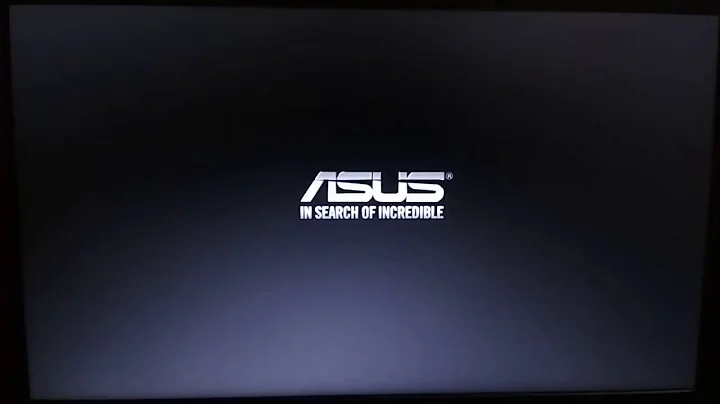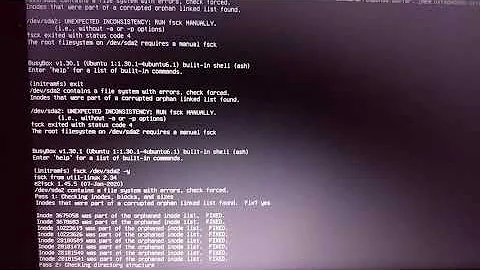Won't boot (drop to busybox) after kernel upgrade (with encrypted disks)
Solution 1
Ok, figured it out.
The UUID of sdb3_crypt (where / and swap are located) somehow wasn't right in /etc/crypttab. I verified this by comparing the UUIDs listed in /etc/crypttab with those listed in /dev/disk/by-uuid/. No idea how that got wrong, but I must have fat fingered it somewhere along the way.
I corrected /etc/crypttab with the correct UUID of /dev/sdb3, then updated the initramfs ($update-initramfs -c -k 4.4.0-24-generic). Reboot and now it works ok.
Solution 2
I had a similar problem except my /etc/crypttab was completely missing. Recently I'd upgraded my mechanical hard drive to a SSD. On both I have everything but /boot encrypted, and the boot process was working just fine. Also, I checked a backup from a few weeks prior, and crypttab was there then.
I followed the answer to this post to fix my problem.
Reinstall to existing encrypted partitions
Note the comment re three of the mounts. These are wrong and should be:
# mount --bind /dev /mnt/ubuntu/dev
# mount --bind /sys /mnt/ubuntu/sys
# mount -t proc none /mnt/ubuntu/proc
Also, note that the UUID in crypttab must be for the container that contains the LUKS volume (in my case /dev/sda5), not for the LUKS volume after is is decrypted. (It says this, but I missed it the first time around, so I thought I'd point this out.)
Final note, gotta say that this poor behavior on the part of the updater - rendering the computer unbootable - is the kind of problem that keeps Linux from getting a wider audience among typical desktop users.
Related videos on Youtube
cuvy
Updated on September 18, 2022Comments
-
cuvy over 1 year
I have two systems - a 14.04.03 LTS and 16.04 LTS, both of which are not booting after recent kernel upgrades. Any help would be appreciated - I'm no expert, but it seems to me like the new kernel just isn't seeing the encrypted filesystems at boot time.
For both systems, I used the installer to encrypt the boot drive. Later, I added a second disk, encrypted using LUKS, automounted at boot time using a keyfile. I (roughly - was done after system was installed and booted) followed the instructions here:
Here's some more details of the systems:
For the 16.04 LTS system:
Hardware is an mSATA SSD on
/dev/sdb, which Ubuntu was installed on using the automatic partition setup (/and swap). A 500GB Sata drive on/dev/sdais used for/data- after system was up and running, luks partition was created and set to auto mount on boot with a keyfile.$ uname -a Linux <hostname> 4.4.0-21-generic #37-Ubuntu SMP Mon Apr 18 18:33:37 UTC 2016 x86_64 X86_64 GNU/Linux $ cat /etc/fstab # <file system> <mount point> <type> <options> <dump> <pass> /dev/mapper/ubuntu--vg-root / ext4 errors=remount-ro 0 1 # /boot was on /dev/sdb2 during installation UUID=5039XXXX-XXXX-XXXX-XXXX-d2b4XXXXXXXX /boot ext2 defaults 0 2 # /boot/efi was on /dev/sdb1 during installation UUID=1DXX-XX4D /boot/efi vfat umask=0077 0 1 /dev/mapper/ubuntu--vg-swap_1 none swap sw 0 0 # encrypted disk /data (unlocked with keyfile /dev/mapper/data_crypt /data ext4 errors=remount-ro 0 1 $ cat /etc/crypttab sdb3_crypt UUID=0bg9rz-XXXX-XXXX-XXXX-XXXX-XXXX-XXqvBH none luks data_crypt UUID=453cXXXX-XXXX-XXXX-XXXX-6926XXXXXXXX /root/<keyfile> luksWhen
4.4.0-21is selected from grub, a password prompt to unlocksdb3_cryptcomes up straight away. The system then hangs at the ubuntu startup prompt. Pressing delete shows the following error message. After a few minutes the system actually does boot, anddata_cryptis mounted on/dataas expected[ 2.091698] [drm:intel_set_pch_fifo_underrun_reporting [i915]] ERROR uncleared pch fifo underrun on pch transcoder a [ 2.091735] [drm:intel_pch_fifo_underrun_irq_handler [i915]] ERROR PCH transcoder A FIFO underrun lvmetad is not active yet, using direct activation during sysinit Volume group "ubuntu-vg" not found cannot process volume group ubuntu-vg /run/lvm/lvmetad.socket: connect failed: no such file or directory: Reading all physical volumes. This may take a while... Found volume group "ubuntu-vg" using metadata type lvm2 /run/lvm/lvmetad.socket: connect failed: no such file or directory: WARNING: failed to connect to lvmetad. Falling back to internal scanning. 2 logical volume(s) in volume group "ubuntu-vg" now active /dev/mapper/ubuntu--vg-root: clean 488960/6750209 files, 11825728/26996736 blocks [ ***] A start job is running for dev-disk-by\x2duuid-0bg9rZ\X2deNSE\x2d1E8u\x2XXXXX\x2XXXXX\x2XXXX\x2dZpqvBH.device (xxS / 1min 30s)From the Grub menu, selecting either 4.4.0-22 or 4.4.0-24 and then pressing delete shows the following information (transcribed):
[ 2.091698] [drm:intel_set_pch_fifo_underrun_reporting [i915]] ERROR uncleared pch fifo underrun on pch transcoder a [ 2.091735] [drm:intel_pch_fifo_underrun_irq_handler [i915]] ERROR PCH transcoder A FIFO underrun lvmetad is not active yet, using direct activation during sysinit Volume group "ubuntu-vg" not found cannot process volume group ubuntu-vg /run/lvm/lvmetad.socket: connect failed: no such file or directory: WARNING: failed to connect to lvmetad. Falling back to internal scanning. Reading all physical volumes. This may take a while.The last 3 lines repeat maybe 30 times, and after a few minutes drops to a busybox shell. Manually running
cryptsetup luksOpen /dev/sdb3 sdb3_crypt(and entering passphrase) is ok, but then I can't mount this (probably because it is in initramfs and I don't know what I'm doing there).Deleting lines relating to
data_cryptfrom/etc/fstaband/etc/crypttabmakes no difference, so I don't think this is related to the automount of this disk causing issues.I have also tried re-creating the initramfs for these kernels, which has not made any difference.
I am also experiencing a similar problem on a 14.04.03 LTS system as described below, but can't provide exact details (it is the system I'm posting this from).
For 14.04.03 LTS System:
Hardware is an NVMe SSD for
/and swap, and a 1TB SATA disk for/data. Again, Ubuntu was installed onto the SSD, and then later the SATA drive was connected, set up as an encrypted partition using luks, then added to automount at boot with a keyfile.packages for xenial kernel have been installed:
linux-generic-lts-xeniallinux-headers-generic-lts-xeniallinux-image-generic-lts-xenial
Command output:
Linux hostname 4.2.0-36-generic #42~14.04.1-Ubuntu SMP Fri May 13 17:27:22 UTC 2016 x86_64 x86_64 x86_64 GNU/Linux $ cat /etc/fstab # <file system> <mount point> <type> <options> <dump> <pass> /dev/mapper/ubuntu--vg-root / ext4 errors=remount-ro 0 1 # /boot was on /dev/nvme0n1p2 during installation UUID=0657XXXX-XXXX-XXXX-XXXX-1be3XXXXXXXX /boot ext2 defaults 0 2 # /boot/efi was on /dev/nvme0n1p1 during installation UUID=AEXX-XX66 /boot/efi vfat defaults 0 1 /dev/mapper/ubuntu--vg-swap_1 none swap sw 0 0 # encrypted disk /data (unlocked with keyfile /dev/mapper/data_crypt /data ext4 errors=remount-ro 0 1 $ cat /etc/crypttab nvme0n1p3_crypt UUID=61235695-XXXX-XXXX-XXXX-962cXXXXXXXX none luks,discard data_crypt UUID=2e92XXXX-XX57-XXXX-XXXX-af9fXXXXXXXX /root/<keyfile> luksAny of the 4.4 series kernels fails to boot. The 4.2 series kernel boots fine though.
-
Philippe over 7 yearsHaving the exact same issue with 16.10 and moving from kernel 4.4 to 4.8.
-
Philippe over 7 yearsDoes your /etc/crypttab take the UUID from sda3 or from sda3_crypt? I have two different UUID's when checking with lsblk -o +UUID






